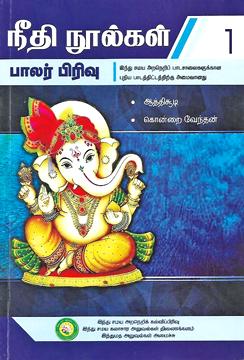
As most of us know, there are 12 vowel letters in Tamil.
Tamil Literatures is one of the oldest literature in the world. Evidence shows that it existed several decades before 3rd century B C.
Among the many scholars, writers and poets was a woman poet named Avvaiyaar. The exact period of her existence has not been established, as there were others with the same name. However, a set of couplets of wisdom is believed to have been written by her. A Tamil film produced by Gemini Productions in Chennai in the 1950s narrates her history with her couplets and songs. The late K B Sundaraambal was featured as Avvaiyaar.
In 2018, The Hindu Religious Moral Education Section of the Hindu Religious Cultural Affairs Department, Ministry of Culture in Sri Lanka has under the direction of its Director, A Uma Maheswaran published a series of booklets of moral values found in Tamil Literature several centuries ago. Dr K Raghuparan, Senior Lecturer, Linguistic Department, South Eastern University has compiled in alphabetical order couplets from Aaththisoodi enunciated by the earliest woman Tamil Poet, Avvaiyar. There are 91 such couplets with explanatory notes.
I have translated some of them into English for the benefit of non-Tamil speaking readers. These maims are universal and some of the sayings may not be in consonance with the belief of some. Nevertheless, I am sure some seniors may remember the good sayings they may have learnt in the good old days.
1. Desire to offer Alms
2. Anger should be subsided
3. Do not tell others of your good and bad characteristics
4. Do not abandon your enthusiasm
5. Do not ignore your mathematical and linguistic knowledge
6. To beg is demeaning
7. Give the needy the food and then eat
8. Adjust yourself to what is practical in the world
9. Do not give up what you learn
10. Do not mouth jealous words
11. Say what you saw
12. Say all things in kind words
13. Befriend only when you are sure of the other’s good characteristics
14. Protect your parents
15. Never forget the help given by others
16. Cultivate in the right season
17. Do not do what you cannot do
18. Sleep on a soft cotton mattress
19. Do not speak cheating others
20. Do not do uncivilized acts
21. Learn all you want while young
22. Do not forget to give others
23. Do not sleep long
24. Give up scolding others in anger
25. Cleanse yourself from bad elements
26. Do not give up your good nature
27. Do not move away from good friends
28. Do not harm others
29. Listen to what the learned say
30. Do not hide your skills from others
31. Join the group of learned people
32. Do not speak lies as if it was the truth
33. Do not forget your good qualities
34. Do not use harsh words that make others angry
35. Do not desire gambling
36. Do what you do perfectly
37. Do not idle
38. Act good so that the world praises you
39. Do volunteer service to Lord Vishnu
40. Don’t leave room for sorrow
41. Don’t defame the deity
42. Don’t swim in deep sea
43. Don’t eat food that brings ill health
44. Read many good books
45. Dispel your ignorance
46. Don’t use unnecessary words
47. Don’t eat too much
48. Don’t go after other women
49. Don’t praise yourself
50. Desire to learn the skills
51. Get up at dawn
52. Don’t believe what your enemies say
53. Never show partiality in your words
Of 108 couplets I have given only the above maxims.
The booklet is primarily meant for children in primary classes.
The remaining part of the booklet has 89 quatrains from Kontrai Venthan.
